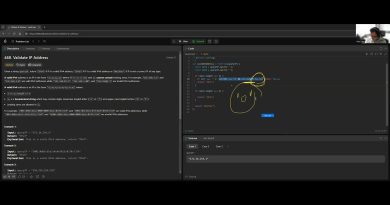Azure Virtual Network | Understanding IP Address
In this video “Understanding IP Address in Virtual Network”, we will be learning and exploring in-depth the various aspects of AZURE. Each video is dedicated to a specific concept in AZURE.
Topics covered:
Understanding Network Resources
• IP addresses: There are two types of IP addresses assigned to resources in Azure: public and private.
a. Public IP Addresses allow Azure resources to communicate with the Internet and other Azure public-facing services like Azure Redis Cache.
b. Private IP Addresses allows communication between resources in a virtual network, along with those connected through a VPN, without using Internet-routable IP addresses.
Public IP Addresses
• There are two methods in which an IP address is allocated to a public IP resource – dynamic or static.
o In the dynamic allocation method, the IP address is not allocated at the time of its creation. Instead, the public IP address is allocated when you start (or create) the associated resource (like a VM or load balancer). The IP address is released when you stop (or delete) the resource. This means the IP address can change.
o In the static allocation method, the IP address for the associated resource does not change. In this case, an IP address is assigned immediately. It is released only when you delete the resource or change its allocation method to dynamic.
• Public IP addresses allow Azure resources to communicate with Internet and Azure public-facing services such as Azure Redis Cache, Azure Event Hubs, SQL databases, and Azure storage.
• In Azure Resource Manager, a public IP address is a resource that has its own properties. You can associate a public IP address resource with any of the following resources:
Private IP Addresses
1. An IP address is allocated from the address range of the subnet to which the resource is attached.
2. The default allocation method is dynamic, where the IP address is automatically allocated from the resource’s subnet (using DHCP). This IP address can change when you stop and start the resource.
3. You can set the allocation method to static to ensure the IP address remains the same. In this case, you also need to provide a valid IP address that is part of the resource’s subnet.
4. Private IP addresses allow Azure resources to communicate with other resources in a virtual network or an on-premises network through a VPN gateway or ExpressRoute circuit, without using an Internet-reachable IP address.
5. In the Azure Resource Manager deployment model, a private IP address is associated with the following types of Azure resources: o VMs
This video was compiled by Mr. Sandeep Soni, a Microsoft Certified Trainer and an Azure Solution Architect. Know more – https://www.bestdotnettraining.com/sandeepsoni
For Complete Azure Online Training
Online Training Please visit:https://www.bestdotnettraining.com/azuretraining
Mr. Sandeep Soni is a famous Corporate Tainer in Microsoft Azure AZ-103, AZ-203, AZ-300, AZ-301, AZ-400, AZ-500, Containerization in Docker, Microservices – Kubernetes and Azure Service Fabric and more…
For Corporate Training requests, please contact Mr. Soni @ +91 9849001840, or email him to sandeepsoni@deccansoft.com.
Or DM in LinkedIn – https://www.linkedin.com/in/sandeepsonimct/
Please subscribe to our channel for more related videos: https://www.youtube.com/user/Deccansoft123
For any course-related queries, reach us @ +91 8555823343 / +91 8008327000 Kashmira Shah
Please leave your comment about the videos.
For more updates on courses and tips follow us on:
– Facebook: https://www.facebook.com/DeccansoftHome
– Twitter: https://twitter.com/deccansoft
– LinkedIn: https://in.linkedin.com/company/deccansoft-software-services
– Website: https://www.deccansoft.com/ or https://www.bestdotnettraining.com/
– Join our WhatsApp group – https://chat.whatsapp.com/HzE43FXv0HJ2z5qGSPDren
ip address


